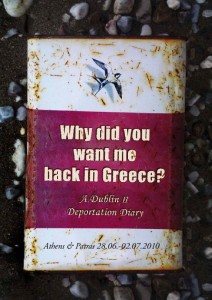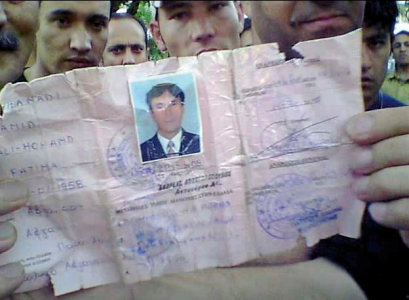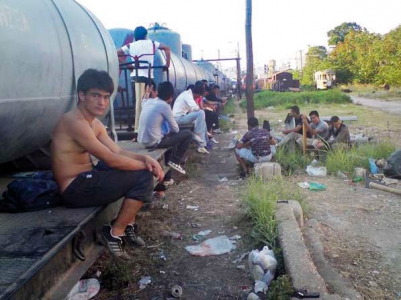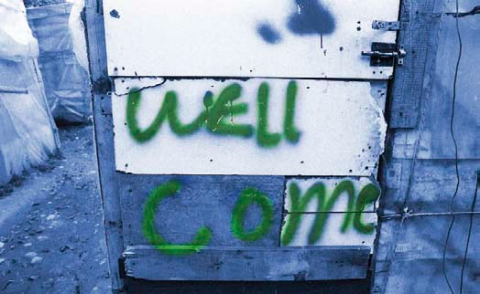Stop the practice of deportation and collective hearings!
The human rights activist and political refugee Salomon Wantchoucou has chosen not to participate again in the illegal and forcible procedure of the so-called embassy hearings. Already four times he has participated in the so called Hearings. On 26.08.2010 in Berlin will once again be a collective Hearing - Landesamt für Bürger und Ordnungsangelegenheiten Berlin, Friedrich Krause-Ufer 24, 13353 Berlin - Immigration Office.
We ask for your support. This courageous and correct step of Mr. Salomon Wantchoucou is a stand against the harassment and racist thought patterns of forced Hearings.
We demand the recognition of his rights.
We ask for your solidarity. Send the below protest faxes to the responsible, competent authorities:
Saple letter for download:
http://thecaravan.org/files/caravan/salomon_fax_en.pdf
Sender:
_____________________
_____________________
_____________________
to:
Landesamt für Bürger und Ordnungsangelegenheiten Berlin,
Friedrich Krause-Ufer 24, 13353 Berlin
Ausländerbehörde
Mrs. Langeheine
Tel: (030) 90269-0
Fax: 030902691299
Ausländerbehörde Wittenberg
Leiterin: Frau Makiola
Head: Mrs Makiola
Tel 03491/479 543
Tel 03491/479 544 Branch Gräfenhainichen
Fax: 03491/479 572
Dear Ladies and Gentlemen,
I support the decision of Mr. Salomon Wantchoucou not to apear to the renewed collective Hearings which are going to be held on 08.26.2010 in Berlin.
Mr. Salomon Wantchoucou has since his arrival in Germany all his data - name, place of birth, etc. correctly given to the refugee and immigration office. After two years the immigration authorities wrote his identity "Uknown" in his papers. Since then he had to support several embassy hearings and procedures. He was also sent to the Embassy of the Republic of Benin and the Republic of Nigeria. Now he is once again to be forced to a "collective Hearing Benin". His asylum and residence procedures are blocked.
Mr. Salomon Wantchoucou has from the begining gave correct information and had cooperated. He is not guilty and has decleard his identity forever.
Mr. Salomon Wantchoucou is now in Germany because of political persecution. He was the victim of a political assassination in the Republic of Benin. He is a criticizer of corruption and bad government of Benin.
Since his escape from the Republic of Benin to Germany for refug, he has continued his commitment to political and human rights activism - both in Benin as in Germany.
He is one of the founder of the "refugee initiative Möhlau Wittenberg.
Because of his human rights and political activities in Germany, he always recieved from the district of Wittenberg threats and intimidation.
We criticize and condemn the treatment to an innocent refugees, the activist, Solomon Wantchoucou by the competent authorities of the district of Wittenberg, especially the branch Gräfenhainichen.
I emphasize explicitly: No one shall be sent to a country where he or she is exposed to danger and death.
I note that you aim directly at his life, if you follow his deportation.
I urge a rejection of the "collective Hearing Benin", which is to take place on 26.08.2010 in Berlin with ten other refugees.
I urge a secure and permanent residence permit for Mr. Salomon Wantchoucou.
______________________
Signature Date
Background
The practice of embassy hearings in the expression of a nationalist and colonial mentality. It is based on a "völkische Weltanschauung" (which was an important part of the German national socialism), i.e. the ideology, that only that person can be part of a certain nation/people that provides certain "völkische" respectively "racial" features, resp. in colonial terms "tribal" features that are defined mainly by physical features such as height, statue, form of the ead, colour of skin, colour of eyes, the way of talking.
Whereas in Germany people believe to have overcome this backwardish and reactionary idea of belongig to nation and people are - at least partly - proud of their enlightened multiculturalism (which allows now and then even somebody who is not white, blond, blue-eyed to be a German), that degree of enlightenment is not thought to be adequate for an African state.
The criterias for the distribution of nationalities to refugees by the embassy hearings are referring to "tribal" features and they are incontradiction to a progressive and enlightened way of defining nation and nationality.
That there is no criticism on applying such reactionary criteria for an African state (whereas there are not adequate anymore for a modern European state) shows once again the colonial and racist perspective on Africa, but also questions if this "völkische" mentality has really been overcome in Germany.
For example:
A woman from a country D went to country M. In Country M, she met a friend and became pregnant. The man disappears, or dies and she can not alone care for the baby, or she may accidentally dies. Does it mean that the daughter or the boy does not comes from country M?
Salomon Wantchoucou is a victim of a political assassination in the Republic of Benin. He is a critic of corruption and bad government of Benin.
Salomon Wantchoucou has been facing a lot of psychological threats and intimidation in the local government of Wittenberg, because of his human right and political activities. He is one of the founder of the "refugee initiative Möhlau Wittenberg. Instead of according him resident permission and solidarity. They do not consider his family situation: the early death of his biological parents, who came from Benin and South Africa. He then lived in Benin with adoptive parents, who died in 2001 in a car accident. He lost the Beninese nationality. Since then Solomon Wantchoucou is stateless. He wrote on 25.02.2009 an official letter to the Embassy of Benin, with a request for natinality confirmation. The copy of this letter of the negative response message from 15.04.2009 have been sent to the competent authorities in Wittenberg.
Already on 05/03/2003 they had forced him also to collective Hearing, to be present in the Benin Embassy regardless of the background of his political opposition.
He was sent on 11.11.2008 by the competent authorities of Wittenberg to the Nigerian Embassy, despite the fact that he is not a Nigerian. Then truthfully the Nigerian Embassy informed, that he was not a citizen of Nigeria. They also sent him on 04.10.2004 and on 10.06.2009 at different linguistic analysis, in which he participated. After all of these involvements, the competent authorities accord him for many years, vouchers instead of cash. He was denied a working permit for many years. He has through all these years, no freedom of movement.
Through the present compulsory forced Hearing from the immigration authorities, once again threatened the lives of those affected. Salomon Wantchoucou currently has no contact with any relatives in South Africa and Benin. This treatment, which he recieved by the competent authorities, including the isolation of the Camp Möhlau could end up with the result that his post traumatic disorder, that he suffered in the attack in Cotonou in 2001 worsened.
Flüchtlingsinitiative Möhlau Wittenberg ; no lager halle;
Die Karawane für die Rechte von Flüchtlingen und Migranten;
The VOICE Refugee Forum




